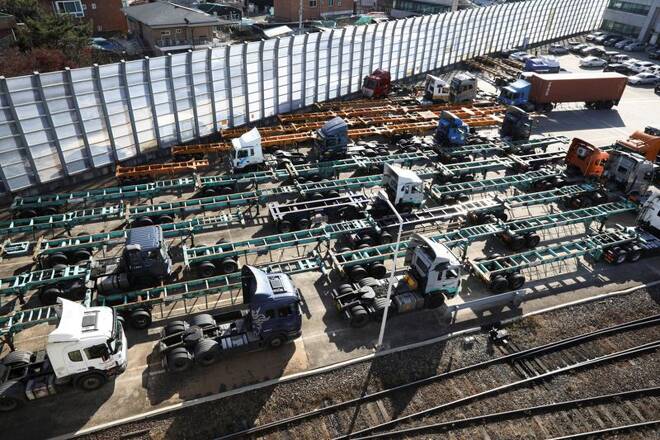Advertisement
Advertisement
South Korea considers ordering more truckers back to work
By:
SEOUL (Reuters) - The South Korean government is expected to order truckers serving the petrochemical and steel sectors to return to work this week as a national strike by truckers entered its 14th day on Wednesday, media reported on Wednesday.
By Joyce Lee and Ju-min Park
SEOUL (Reuters) – The South Korean government was moving on Wednesday towards ordering more truckers to return to work as their national strike entered its 14th day.
But the administration has so far failed to achieve a breakthrough in negotiations with the truckers, whose strike to extend an income-guarantee programme has widely obstructed shipments from the country, the world’s sixth-biggest exporter.
Cabinet would meet on Thursday to discuss ordering drivers who serve the petrochemical and steel industries to get back to work, the Finance Ministry said.
Last month, the government ordered drivers serving the cement industry to return to work.
The strike has disrupted supply chains and, according to the government, in its first 12 days delayed delivery of goods worth 3.5 trillion won ($2.65 billion).
Despatches of petrochemicals for domestic delivery were down to 65% of normal levels, the transport ministry said on Wednesday, while steel shipments for all customers were running at 47%.
Petrochemical companies are considering cutting production as early as the upcoming weekend due to shortages of raw material or space for storing inventory that cannot be despatched.
Despatches of cement have bounced back to 93% of normal levels from 10% earlier in the strike, thanks to the government telling drivers to return to work, according to the Korea Cement Association lobby group.
Although they are getting limited road freight service, ports are operating.
Suffering from soaring fuel costs, as many as 25,000 striking truckers are calling for a temporary minimum-pay scheme for their industry to be made permanent.
On Wednesday, some said loss of income in the strike was becoming difficult for drivers to bear.
“Every one of us made enormous efforts to stop our trucks,” Lee Sung-chul, a striking cement trailer driver, told a meeting organised by a member of parliament on Wednesday.
“But the strike has gone on for more than 10 days. Given family finances and car instalments, some non-union drivers have started work again,” said Lee, himself getting calls from his nervous wife to return to work.
Another striking trucker, Lee Geum-sang, who drives a fuel tanker, said he felt time was not on the truckers’ side.
“It is very frustrating. I am afraid many drivers on the strike won’t make it until next week,” he said.
($1 = 1,321 won)
(This story has been corrected to say petrochemical companies may cut production as early as the upcoming weekend, not next week, in the seventh paragraph
(Reporting by Joyce Lee and Ju-min Park; Additional reporting by Soo-hyang Choi; Editing by Simon Cameron-Moore and Bradley Perrett)
About the Author
Reuterscontributor
Reuters, the news and media division of Thomson Reuters, is the world’s largest international multimedia news provider reaching more than one billion people every day. Reuters provides trusted business, financial, national, and international news to professionals via Thomson Reuters desktops, the world's media organizations, and directly to consumers at Reuters.com and via Reuters TV. Learn more about Thomson Reuters products:
Did you find this article useful?
Latest news and analysis
Advertisement
